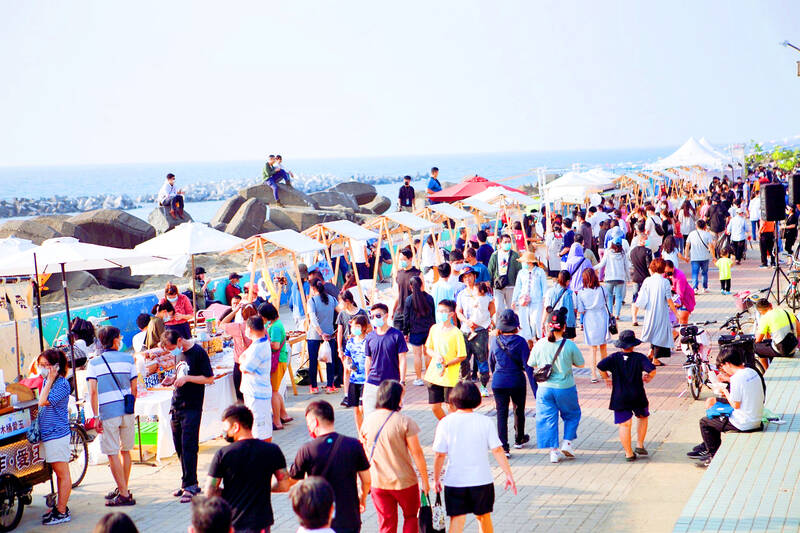The Central Epidemic Command Center (CECC) yesterday reported 11,888 new local COVID-19 cases, the lowest daily caseload since late April, adding that weekly new cases have also declined for six consecutive weeks.
Centers for Disease Control (CDC) Director-General Chou Jih-haw (周志浩) said that daily local cases declined by 28 percent from Monday last week, to the lowest number since April 28.
Deputy Minister of Health and Welfare Victor Wang (王必勝), who heads the center, said 128,420 new local cases were reported last week, a decline by 16.33 percent compared with the week before, and case numbers have dropped for six consecutive weeks.

Photo: Copied by Ge Yu-hao, Taipei Times
CDC Deputy Director-General Philip Lo (羅一鈞) said the 41 newly confirmed deaths include 39 people who had chronic illnesses and 22 people who did not get a vaccine booster.
Lo said 102 virus samples — from 81 local and 21 imported cases — were sequenced last week, and 98.8 percent of the local cases were caused by the Omicron BA.5 subvariant of SARS-CoV-2, while only one case had the BA.2 subvariant.
Of the imported cases, 10 people had BA.5, nine had BA.2.75 and one of each had the XBB and BQ.1 subvariants, he said, adding that the imported cases of BA.2.75 have increased from 6 percent to 28 percent, and to 43 percent in the past three weeks, and would likely replace BA.5 to become the dominant strain.
However, Lo said BA.2.75 does not have stronger immune escape ability than the XBB or BQ subvariants, so it has not replaced BA.5 as the dominant strain in many countries, although XBB has become the dominant strain circulating in Singapore.
Meanwhile, Minister of Health and Welfare Hsueh Jui-yuan (薛瑞元) on Sunday said the CECC had blocked many fraudulent brokers of COVID-19 vaccines last year, which led to opposition parties demanding that Wang name the brokers and question if they included a renowned religious group.
Wang yesterday said Fo Guang Shan’s (佛光山) affiliated Buddha’s Light International Association ROC on May 27 last year proposed donating Johnson & Johnson’s Janssen COVID-19 vaccines to the nation, albeit without relevant documents.
Association members visited the CECC on June 1 to discuss the matter, but Johnson & Johnson on June 2 last year said it would only negotiate with governments regarding its vaccine sales.
The association on June 7 last year informed the CECC that it had learned the government had contacted Johnson & Johnson about purchasing vaccines, and said if a deal were to be made it would support the purchase through a donation of 200,000 to 500,000 doses, he said.
However, Johnson & Johnson was only able to promise delivery for this year, so the donation was unsuccessful, but Wang said the center was grateful for the association’s enthusiastic offer.
The CECC is thankful to the individuals and organizations that tried to help secure vaccines, Wang said.
However, he said it was the center’s duty to ensure the purchase of “authentic vaccines,” and that they “are really able to receive them,” so it has asked people to provide documents including the delivery schedule, quantity and authorized distributor certificate from the vaccine company, he said.
If requirements are met, the center would assist them in negotiations, Wang added.

Chinese Nationalist Party (KMT) Chairman Eric Chu (朱立倫), spokeswoman Yang Chih-yu (楊智伃) and Legislator Hsieh Lung-chieh (謝龍介) would be summoned by police for questioning for leading an illegal assembly on Thursday evening last week, Minister of the Interior Liu Shyh-fang (劉世芳) said today. The three KMT officials led an assembly outside the Taipei City Prosecutors’ Office, a restricted area where public assembly is not allowed, protesting the questioning of several KMT staff and searches of KMT headquarters and offices in a recall petition forgery case. Chu, Yang and Hsieh are all suspected of contravening the Assembly and Parade Act (集會遊行法) by holding

PRAISE: Japanese visitor Takashi Kubota said the Taiwanese temple architecture images showcased in the AI Art Gallery were the most impressive displays he saw Taiwan does not have an official pavilion at the World Expo in Osaka, Japan, because of its diplomatic predicament, but the government-backed Tech World pavilion is drawing interest with its unique recreations of works by Taiwanese artists. The pavilion features an artificial intelligence (AI)-based art gallery showcasing works of famous Taiwanese artists from the Japanese colonial period using innovative technologies. Among its main simulated displays are Eastern gouache paintings by Chen Chin (陳進), Lin Yu-shan (林玉山) and Kuo Hsueh-hu (郭雪湖), who were the three young Taiwanese painters selected for the East Asian Painting exhibition in 1927. Gouache is a water-based

Taiwan would welcome the return of Honduras as a diplomatic ally if its next president decides to make such a move, Minister of Foreign Affairs Lin Chia-lung (林佳龍) said yesterday. “Of course, we would welcome Honduras if they want to restore diplomatic ties with Taiwan after their elections,” Lin said at a meeting of the legislature’s Foreign Affairs and National Defense Committee, when asked to comment on statements made by two of the three Honduran presidential candidates during the presidential campaign in the Central American country. Taiwan is paying close attention to the region as a whole in the wake of a

OFF-TARGET: More than 30,000 participants were expected to take part in the Games next month, but only 6,550 foreign and 19,400 Taiwanese athletes have registered Taipei city councilors yesterday blasted the organizers of next month’s World Masters Games over sudden timetable and venue changes, which they said have caused thousands of participants to back out of the international sporting event, among other organizational issues. They also cited visa delays and political interference by China as reasons many foreign athletes are requesting refunds for the event, to be held from May 17 to 30. Jointly organized by the Taipei and New Taipei City governments, the games have been rocked by numerous controversies since preparations began in 2020. Taipei City Councilor Lin Yen-feng (林延鳳) said yesterday that new measures by